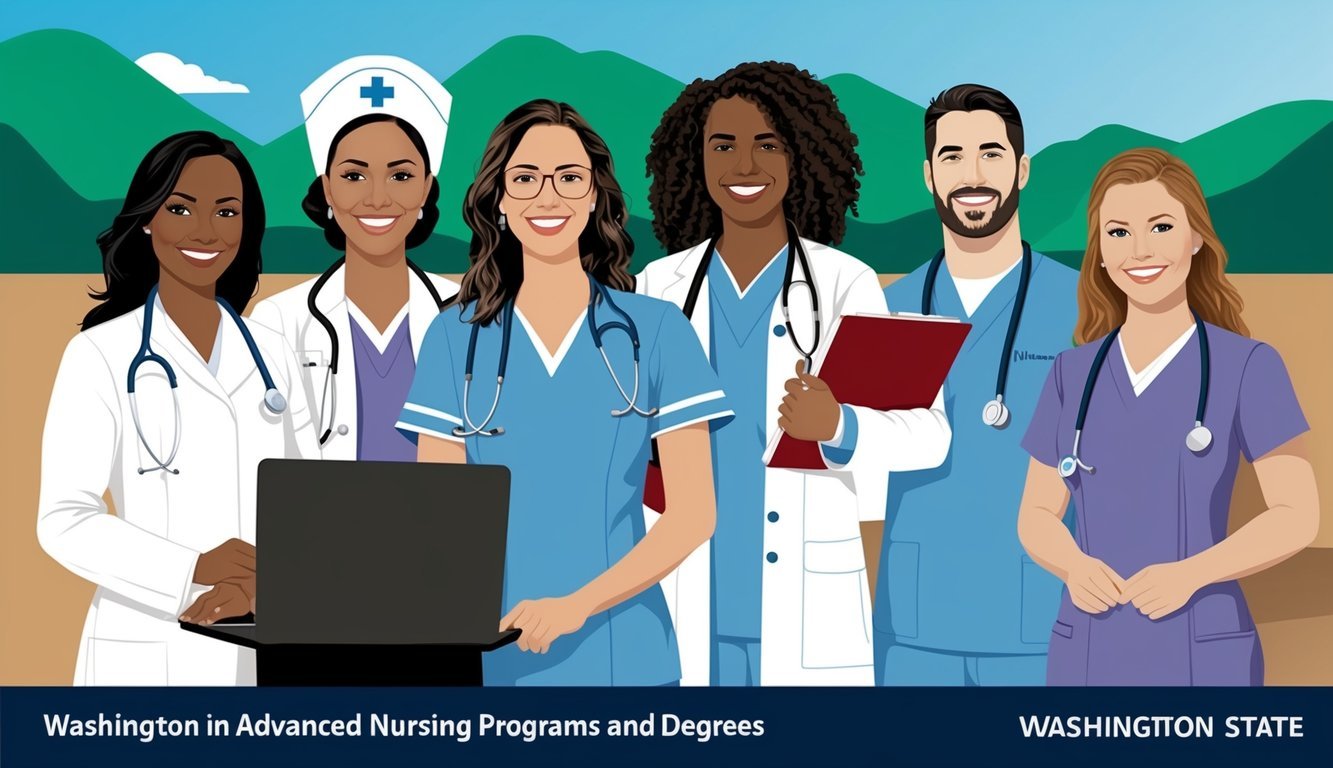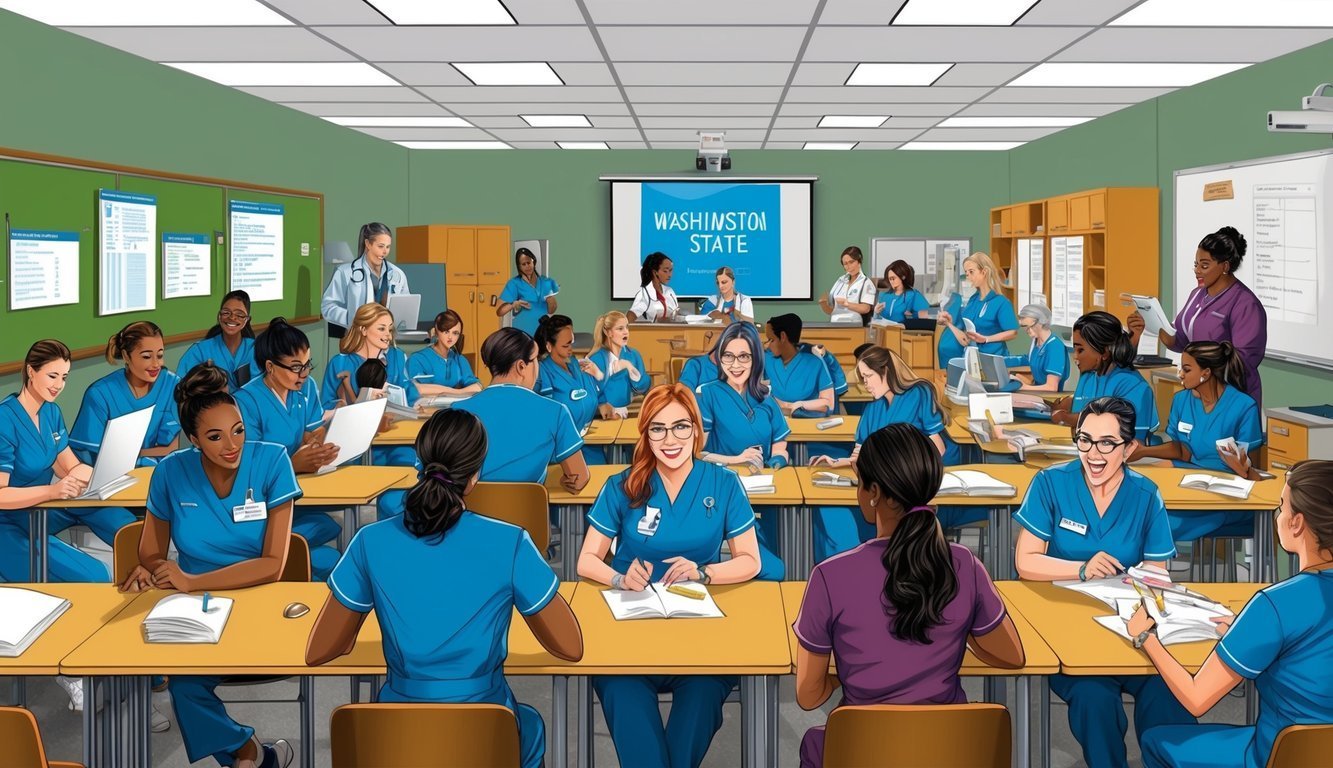Nursing is a rewarding career that offers many opportunities for growth and advancement.
If you are considering a nursing program, Washington state has a variety of nursing education options that can help you seize those opportunities.
From Bachelor of Science in Nursing (BSN) programs to advanced degrees, Washington has a robust selection of paths tailored for aspiring nurses.
In addition to traditional programs, many schools in Washington also offer accelerated options, which allow you to complete your degree in a shorter timeframe.
These programs often include clinical experiences to give you hands-on training that is essential for your nursing career.
Whether you are just starting or looking to further your education, Washington’s nursing programs provide support and resources to help you succeed.
Now that you’re aware of the options available, exploring what each program includes will aid you in making an informed decision about your future in nursing.
Key Takeaways
- Washington state offers diverse nursing programs to fit various career goals.
- Accelerated and advanced nursing degrees are available for fast-tracking your education.
- Support resources are accessible to aid in your nursing journey.
Overview of Nursing Education in Washington State

Nursing education in Washington State offers a range of accredited programs to help you become a skilled nurse.
Understanding the accreditation process and the variety of nursing programs available is crucial for your success in this field.
Accreditation and Washington State Board of Nursing
The Washington State Board of Nursing regulates nursing education programs in the state.
Accreditation ensures that the programs meet specific educational standards.
They evaluate and improve nursing schools consistently to provide quality education.
You should look for programs accredited by recognized agencies, such as the Commission on Collegiate Nursing Education (CCNE) or the Accreditation Commission for Education in Nursing (ACEN).
Completing an accredited program is vital for obtaining your nursing license and will significantly impact your career options.
Make sure to check the Board’s website for a list of accredited nursing programs in Washington State.
You can find more information on their regulations and standards here.
Variety of Nursing Programs Available
Washington State offers a diverse range of nursing programs to fit different career goals.
You can choose from the following options:
- Associate Degree in Nursing (ADN): Usually takes two years to complete and prepares you for entry-level positions.
- Bachelor of Science in Nursing (BSN): A four-year program that provides in-depth knowledge and skills, making you more competitive in the job market.
- Master’s and Doctoral Programs: For advanced practice roles, including Nurse Practitioners and Nurse Educators.
The University of Washington, for example, has been recognized for its excellent programs, offering both traditional and accelerated BSN pathways.
You can explore more top nursing schools in Washington State by visiting this resource.
By knowing your options, you can select a program that best suits your interests and career goals.
Bachelor of Science in Nursing (BSN) Programs
In Washington State, Bachelor of Science in Nursing (BSN) programs provide you with a solid foundation in nursing education and prepare you for a successful career as a registered nurse.
These programs focus on clinical skills, critical thinking, and a commitment to healthcare excellence.
Washington State University College of Nursing
The Washington State University College of Nursing offers a highly regarded BSN program designed to equip you with essential nursing skills.
You will engage in hands-on clinical experiences and innovative learning methods.
The program emphasizes patient-centered care and community health.
You’ll access state-of-the-art simulation labs and diverse clinical placements, ensuring you’re well-prepared for real-world healthcare environments.
The faculty consists of experienced professionals dedicated to your success.
Admission Requirements and Program Prerequisites
When applying to a BSN program, there are specific admission requirements.
Generally, you need a high school diploma or equivalent.
Additionally, most programs require:
- Completion of prerequisite courses, such as biology, chemistry, and anatomy.
- A competitive GPA, often around 3.0 or higher.
- Submission of letters of recommendation.
- A personal statement or essay outlining your motivation for pursuing nursing.
Be sure to check the specific requirements for the programs you’re interested in, as they can vary.
Program Outcomes and NCLEX-RN Pass Rates
Program outcomes are crucial for assessing the effectiveness of a nursing program.
In Washington State, BSN programs typically aim to prepare you for the NCLEX-RN exam, which you must pass to become a registered nurse.
Most programs report high pass rates for the NCLEX-RN.
For instance, many institutions achieve pass rates above 90%.
This strong performance reflects the quality of education and preparation you can expect from these BSN programs.
Advanced Nursing Programs and Degrees

Advanced nursing programs offer you the opportunity to enhance your skills and take on leadership roles in healthcare.
Degrees such as the Doctor of Nursing Practice (DNP) and Master of Nursing (MN) provide you with specialized knowledge for advanced patient care.
Doctor of Nursing Practice (DNP) Programs
DNP programs prepare you for the highest level of clinical nursing practice.
You will focus on implementing evidence-based practices and improving patient outcomes.
The curriculum typically includes courses in healthcare policy, clinical leadership, and advanced clinical practice.
In Washington, DNP programs often require a master’s degree in nursing for admission.
The program may take 3-4 years to complete and involves both coursework and a capstone project.
This hands-on project allows you to address real-world healthcare challenges.
For more information on DNP programs in Washington, you can check resources like Nursing Process.
Master of Nursing (MN) and Specializations
An MN degree provides you with a comprehensive understanding of nursing theory and practice.
This program often includes opportunities for specialization in areas such as family nursing, mental health, or nursing education.
You can expect coursework that covers advanced clinical skills, research methods, and ethical issues in nursing.
Many MN programs also require clinical hours to ensure you gain practical experience.
Specializations enhance your marketability and allow you to tailor your career path.
Consider researching different MN programs available in Washington to find the right fit for your goals.
More details can be found on sites like Registered Nursing.
Transition and Advancement in Nursing

Transitioning within the nursing field offers various pathways for career growth.
Understanding these options is essential for your professional development and future job prospects.
Here are some key routes, including RN to BSN programs and Associate Degree in Nursing (ADN) programs.
RN to BSN Pathways
RN to BSN pathways allow registered nurses to enhance their qualifications and expand career opportunities.
In Washington, many programs offer flexible online options.
This makes it easier for you to balance work, study, and personal life.
Some advantages of RN to BSN programs include:
- Career Advancement: Many employers prefer or require a Bachelor of Science in Nursing for leadership roles.
- Higher Salary: BSN holders generally earn more than those with an ADN.
- Comprehensive Curriculum: The program covers advanced topics such as leadership, community health, and research.
To explore RN to BSN programs in Washington, consider institutions like the University of Washington and Washington State University.
Associate Degree in Nursing (ADN) Programs
ADN programs are a popular choice for those entering nursing.
These programs generally take two years to complete, preparing you to become a registered nurse quickly.
Key features of ADN programs include:
- Quick Entry into Workforce: You can start working as a registered nurse sooner compared to other degree pathways.
- Foundation Skills: The curriculum focuses on essential nursing skills and clinical experiences.
- Statewide Options: Various colleges across Washington offer quality ADN programs, such as Lower Columbia College.
Graduates can pursue entry-level nursing jobs in hospitals, clinics, and other healthcare settings.
To find top ADN programs, check resources like NursingProcess.org.
Supporting Nursing Students

Nursing students in Washington State have access to various resources that aid their educational journey.
These resources include financial support and opportunities for clinical practice.
Both aspects are crucial for fulfilling the healthcare needs of the community while enhancing your learning experience.
Scholarships and Financial Aid
Financial support is vital for aspiring nurses.
Numerous scholarships are available to lessen the burden of tuition.
For example, the Washington State Nurses Foundation Scholarships offer four awards of $1,000 annually to those preparing for a nursing career in Washington.
You can also explore the Washington State Opportunity Baccalaureate Scholarship, which provides up to $22,500 for students in high-demand health care majors, including nursing.
This scholarship can be used at eligible public or private colleges in the state, making it an excellent option for funding your education.
Clinical Practice and Professional Development
Hands-on experience is essential in nursing education.
A clinical passport is often required for participation in clinical rotations.
This document allows you to track your progress and competencies in various nursing skills.
You can benefit from practical training and guidance from experienced nursing faculty.
They will help you apply your classroom knowledge in real-world settings, ensuring you are well-prepared for your future career.
Participating in nursing research projects can also enhance your understanding of current healthcare challenges and innovations, providing deeper insights into patient care.
Frequently Asked Questions

This section provides specific answers to common questions about nursing programs in Washington State.
You will find information on accredited programs, duration, online options, and admission requirements.
What are the top accredited nursing programs in Washington State?
Some of the top accredited nursing programs include schools like the University of Washington and Washington State University.
These institutions are recognized for their quality and comprehensive training in nursing.
How long is the duration of typical 4-year nursing programs in Washington State?
A typical 4-year nursing program in Washington State generally lasts for four academic years.
This time frame includes both classroom instruction and clinical practice.
What options are available for online nursing programs in Washington State?
Several institutions offer online nursing programs, including Bellingham Technical College and WGU Washington.
These programs provide flexibility for working professionals or those with other commitments.
Can I complete a nursing program in Washington State within two years?
Yes, you can complete certain nursing programs, like an Associate Degree in Nursing (ADN), in about two years.
Many community colleges offer accelerated programs for those who qualify.
Which universities in Washington State are known for their nursing courses?
Some universities known for their nursing courses in Washington State are the University of Washington, Washington State University, and Seattle University.
Each of these schools offers various nursing degrees and specializations.
What are the admission requirements for nursing schools in Washington State?
Admission requirements vary by program.
Usually, they include prerequisites such as high school graduation or equivalent, a minimum GPA, and letters of recommendation.
Some programs may also require standardized test scores.

